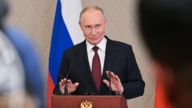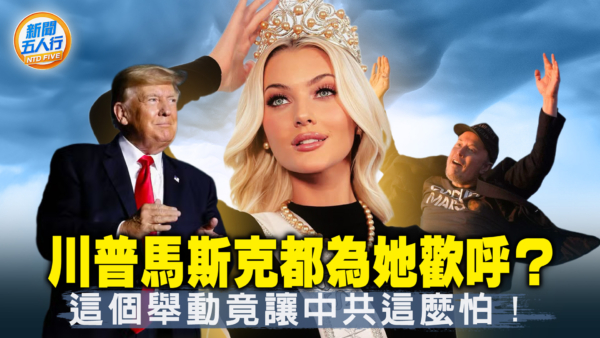【新唐人2011年12月15日讯】中国正式加入世界贸易组织WTO今年迈入第十年,过去美中两国贸易纠纷不断,美国向世贸组织指控中国涉嫌违反世贸规则项目多达12项。12号,美国贸易代表办公室提交给国会的年度报告说,中国到现在没有完全遵守基本自由市场原则,不少国会议员甚至对中国入世的好处持怀疑态度。
中国花了15年的时间才正式加入世界贸易组织,25年来,北京政府虽然在市场准入、降低关税、知识产权保护等方面作了一系列法规修订和承诺。不过,美国贸易代表处在年度报告中指出,中国广泛实施干预政策,使用歧视性的监管程序、和非正式的禁止入境等种种手段,严重影响美国企业的利益。
不过美国一些国会议员认为,美国对华贸易的巨额赤字,导致美国制造业数以百万工人失业。
《新唐人》时事评论员文昭表示,由于中共政府是个集权专制国家,他能够做一些民主国家做不到的事情,如压低劳动力成本、原料成本,使产品出口具有廉价的优势,然后倾销到欧美国家。
文昭:“中国的廉价商品销售到美国以后,使美国的消费者,北美的消费者买到了便宜货,这看起来也许是有一些好处。但与此同时呢,它也使得制造业一些国家衰落,增加了失业率。”
中国“入世”后,出口规模迅速扩大,从2001年占世界的4.3%,居全球第六位,到2010年的10.4%,位居世界第一位。美国贸易代表处的报告认为,只有中国在完全遵守世贸基本规则的前提下,才能保障全球经济体系的平衡发展。
中国通过贸易赚到了大量的外汇,但他并有拿来购买别的国家商品,带动欧美国家经济复苏。
文昭:“那么他是用这些储备外汇去购买钜额美债,当他成为美债主要持有人之后,他就利用这些法码去要胁美国政府。”
美国“南卡罗莱纳大学”艾肯商学院教授谢田表示,美国政府比较不满的是:中国操纵汇率和知识产权问题。
谢田:“就我们现在看的报导,中共从来就没有想说遵守他的承诺,对中国来说加入世贸组织以后呢,他的出口对西方美国出口大幅的增加,他用这办法来带动就业,推动经济,创造就业机会,促进中国周围都是增工厂的发展,赚取大量的外汇。”
谢田表示,中国大量的外汇储备都是从美国贸易得到的,却击垮了美国的制造业,造成美国失业率上升,这是美国老百姓所不愿接受的。中国在自由贸易中破坏了市场机制,受到西方国家的反弹也是必然的。
新唐人记者易如、李庭、朱娣采访报导。
China 10 Years in WTO: USTR Report
China is an official member of the World Trade Organization
(WTO) for 10 years now.
However, trade disputes between US and China still continue.
The US has accused China of violating up to 12 WTO rules.
On December 12, the US Trade Representative’s (USTR)
office issued its annual report to the Congress.
The report stated that China still does not comply
with basic free market principles.
Many members of Congress are even skeptical
about China’s accession to the WTO.
It took China and the Chinese Communist Party (CCP)
15 years to officially join the WTO 10 years ago.
In the last 25 years, the CCP made a series of regulatory
amendments and commitments to market access.
These include lowering tariffs
and intellectual property protection.
Now the USTR office’ annual report states,
that China is not embracing fully the principles of WTO.
Widespread interventions, discriminatory regulatory procedures,
and informal methods seriously affect US companies’ interests.
Some US Congress members even think the huge trade deficit
to China leads to millions of US’ manufacturing job losses.
NTD commentator Wen Zhao said, as China is a centralized
authoritarian state, it can do things democratic countries cannot.
Like lowering labor costs and raw material costs
to lower the costs of the exported goods.
Wen Zhao: “The dumping of cheap goods
benefited the consumers of Europe and the US.
At the same time, this led to the decline of the manufacturing
industries in these countries, rising the unemployment rate."
After joining WTO, China’s share in the world export grew
from 4.3% (2001, ranked 6th) to 10.4% (2010, ranked 1st).
Now the USTR report points out, only if China fully follows
the WTO rules will the global economic system be guaranteed.
China has accumulated a substantial amount
of foreign exchange reserves through trade.
However, China did not use the reserves to buy goods in other
countries to help the economic recovery in Europe and the US.
Wen Zhao: “China used these foreign exchange reserves
to buy huge amounts of the US debt.
When China became a holder of the US debt,
it went on to use this to intimidate the US government."
Professor Xie Tian from the Aiken School of Business,
University of South Carolina agrees with that.
He believes the US government is not satisfied with China’s
manipulation of currency and handling of intellectual property.
Prof. Xie Tian: “From the report now it can be seen again
that CCP does not like to kept it’s promises.
For China, after joining the WTO, exports to the West,
and especially the US, have increased rapidly.
China used the exports to boost employment and economy,
create jobs, and promote the manufacturing, as to gain foreign exchange reserves."
Prof. Xie said, a massive amount of China’s foreign exchange
reserves are obtained from the trade operations with the US.
This has weakened the manufacturing sector of the US,
resulting in the rising unemployment rate.
Thus China needs to fully embrace the principles of the WTO,
as to erase the skepticism about its accession to the system.
NTD reporters Yi Ru, Li Ting and Zhu Di.





























